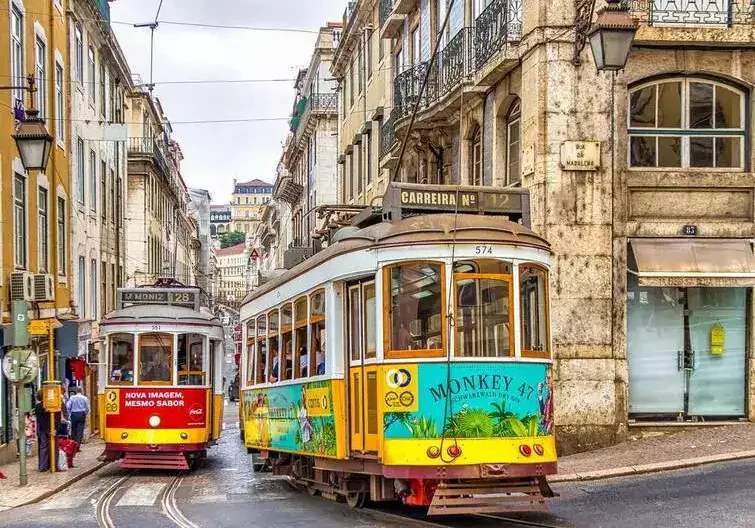Updated: November 29, 2025
Living in Lisbon has a lot to offer. The capital city of Portugal attracts many expats, mainly digital nomads and young professionals. It offers relatively affordable living costs, a high quality of life, and a large tech community.
Most expats are drawn to the sunny weather, rich Portuguese culture, and excellent safety standards. While the job market isn’t the main draw, everything else makes up for it. People are very welcoming, making it the perfect place to settle and raise a family. In this article, we will cover everything you need to know about life in Lisbon, from the best neighborhoods to the type of accommodations to choose from.
Lisbon Cheat Sheet
 Population: 517,802
Population: 517,802- Climate: Mediterranean (mild winters and warm summers)
- Language: Portuguese, with English widely spoken too
- Airport: Lisbon Humberto Delgado Airport
- Best for: Digital nomads and professionals, retirees, families
- International schools: About 30 in Greater Lisbon
- Best neighborhoods: Alvalade, Avenidas Novas, Bairro Alto, Campo de Ourique, Chiado, and Principe Real
- Best things to do and see: Beautiful beaches, vibrant nightlife, historic sightseeing (Castle of St Jorge, Belém Tower), and cultural attractions (MAAT, LX Factory)
Why is everyone moving to Lisbon?
The abundance of expats moving to Lisbon- whether they are retirees, investors, or families – shows just how popular the city is for expats from all walks of life. But why are so many expats moving to Lisbon, Portugal?
Here are some of the key reasons to consider life in Lisbon, Portugal:
Outstanding business and start-up hub: The strategic location and convenient time zone make it easy to conduct business, as does the fact that the Portuguese generally have an excellent command of English.
Excellent weather, stunning scenery, and beautiful beaches: The sublime climate and stunning natural surroundings of beaches and parks are some of the biggest selling points of life in Lisbon.
Flexible immigration policies: Portugal makes it quite easy for foreigners to move to the country, with a range of visa options on the table.
Affordable cost of living with high quality of life: Lisbon offers a great quality of life without the painful price tag of other European capitals.
Is Lisbon safe?
Portugal is the seventh most peaceful country in the world, according to the 2024 Global Peace Index and the crime rate in Lisbon is very low. Lisbon expats enjoy a calm, relaxed lifestyle, and Portuguese nationals are very friendly towards foreigners.
The 7 Best Neighborhoods in Lisbon
So, where is the best place to live in Lisbon? And where do expats live in Lisbon? In the following section, we will provide you with everything you need to know about the best neighborhoods in Lisbon.
This list is also by no means exhaustive, and the best places to live in Lisbon will depend on your lifestyle.
 1. Alvalade
1. Alvalade
Alvalade is one of the most practical neighborhoods in the city and is often overlooked by expats in Lisbon. It’s very easy to enjoy life in Lisbon to the fullest in Alvalade, with a wide range of top restaurants, charming cafes, and green spaces to be found here.
This neighborhood is one of the more peaceful areas in the bustling city and features Jardim do Campo Grande Park, excellent for outdoor activities with the family.
Conveniently located close to the airport, Alvalade is perfect for regular international travelers and families, plus for those who want to retire in Lisbon.
 2. Avenidas Novas
2. Avenidas Novas
Avenidas Novas might be considered one of the best neighborhoods in Lisbon to live in, as many of its leafy, spacious streets are lined with large, beautiful houses – some of the best properties for sale in Lisbon can be found here. Avenidas Novas is also home to Lisbon’s business center, with many working professionals living in this part of town. With many rooftop bars, green spaces, and an excellent public transport system to get around the city, Avenidas Novas is becoming more and more popular with expats in Lisbon.
 3. Baixa
3. Baixa
Baixa was largely rebuilt following the tragic earthquake in the 18th century, in the style of the then-contemporary European city planning trend.
A unique, central part of the city, this neighborhood is perfect if you like strolling around large squares and discovering the exciting culture and heritage of the city. Yes, the Rua Augusta Arch and Praça do Comércio are both impressive architectural achievements and stand-out points in the city.
One of the best things about living in Baixa is that the neighborhood is very strategically placed. Baixa is within close proximity to the nightlife center Bairro Alto, the old town, Alfama and the Castelo de São Jorge (Castle of St Jorge), and Chiado, a key shopping area in the city. Alfama and Graça are the old parts of the city not far from Baixa, and those on the hunt for historic charm should look no further.
You can find out more about Baixa in our article in our guide to Baixa Lisbon real estate.
 4. Bairro Alto
4. Bairro Alto
A short walking distance away from Baixa, you’ll find Bairro Alto.
Bairro Alto is a melting pot of different cultures, fashionable restaurants, and celebrated nightlife. Cais do Sodré, with the famous Pink Street (formerly the city’s red-light district), is one of the liveliest places in Lisbon, with tiny bars spilling out onto the side streets in the evenings and during the weekend.
 5. Campo de Ourique
5. Campo de Ourique
Campo de Ourique is located in a quiet corner of town and is a very nice, family-oriented place in Lisbon. Lovely artisanal shops and an indoor food market are some of the things that make this one of the best neighborhoods in Portugal to live in.
Campo de Ourique is also a popular Lisbon expat neighborhood, largely because it provides quick access to the main parts of the city, and there are plenty of nice cafés and lunch spots to enjoy. Close to Campo de Ourique, Estrela is also a very good option for families, young professionals, and digital nomads.
You can discover more about the charming neighborhood of Campo do Ourique in our guide to Campo do Ourique real estate.
 6. Chiado
6. Chiado
Famous for its lovely cafes and many star attractions (like the São Roque Church, one of the few buildings in Lisbon that survived the 1755 earthquake), Chiado is a lovely place to live. While you’ll find pretty busy streets in the summer months, its central location makes it effortlessly easy to get around the city.
Shoppers will also delight in the range of shops on offer, both chain stores and independent Portuguese shops selling their wares. It’s a lively, upscale neighborhood with theaters, bookstores (including the Livraria Bertrand, the oldest operating bookstore in the world), and a mix of the old and new.
 7. Principe Real
7. Principe Real
Principe Real is a favorite for both tourists and Portuguese nationals looking for upscale living. This part of the city is one of the very best, filled with lovely independent and boutique shops, unique luxury shopping in Portugal, concept stores, a great many restaurants and bars, and stunning properties.
It is certainly one of the more upmarket and busier parts of town. The people living in Principe Real are a mix of young internationals, digital nomads, and Portuguese families. Even actress Scarlet Johansson snapped up an apartment in Principe Real.
You can find out more in our article on real estate in Principe Real.
Finding Accommodation in Lisbon
Real estate in Lisbon is booming, and although property prices have increased rapidly over the past years, there are many parts of the city where you can still get a good deal.
In particular, house prices in the downtown area and in Lisbon city center have shot up, but if you buy outside the center, prices tend to fall. If you are considering buying property in Lisbon, it can be a smart move, as your property will likely increase in value over time given the continued buzz around the Portuguese capital.
 Buying a house in Lisbon
Buying a house in Lisbon

It’s easy to buy a house in Lisbon, and you will find plenty of options open to you, with many property types on the market, from modern apartments to spacious waterfront houses. In our cost of living section later in the article, we’ll delve into more detail on the property prices you can expect to find in Portugal’s major capital city.
Real estate investments in Lisbon are higher than in other parts of Portugal. The average asking price for property in Lisbon was €6,934 per square meter in 2024, while if you look at the Lisbon Metropolitan Area, this falls to €4,935, indicating that it is much more affordable to buy outside the city. Lisbon real estate prices will also vary considerably depending on the neighborhood you choose.
Lisbon land for sale is also more affordable than buying a property, and, although it will take time to build your dream home, you’ll be able to customize it to your personal tastes.
As there is no one ultimate property listing site, it can be a good idea to work with a buyer’s agent, such as Goldcrest, if you are seriously considering moving to Lisbon and buying a home.
 Renting a house in Lisbon
Renting a house in Lisbon
Renting a property in Lisbon can be quite difficult. This is because of the high demand for living in Lisbon in recent years, which has made it difficult to find an available apartment that suits every need. However, with patience, research, and good advice, you should be able to find the perfect place to rent in the city.
If you’re going to rent in Lisbon, see below for estimated monthly rents, according to Numbeo. Note that Lisbon rents can vary depending on the neighborhood and proximity to the city center. To find rental apartments, utilizing expat groups and Facebook groups, alongside rental listing websites, can be a good option.
- Apartment (one bedroom) in the city center: €1,388
- Apartment (one bedroom) outside of center: €1,075
- Apartment (three bedrooms) in the city center: €2,633
- Apartment (three bedrooms) outside of center: €1,767
How to Live in Lisbon as an Expat: Residence Permits and Visas
In this section, we’ll delve into how you can relocate to Lisbon, providing you with insights into how to secure residency in Portugal. If you are moving to Portugal, you will need to get a Portuguese NIF number (tax identification number) as soon as possible, as you will need this number for any major financial transactions. We also recommend that you set up a Portuguese bank account (more on this further below).
 Living in Lisbon as an EU citizen
Living in Lisbon as an EU citizen
If you are an EU citizen hoping to join the many Lisbon expats, relocating is a smooth, convenient process. As part of the European Union, you can freely move between member countries, including Portugal. To move to Lisbon and stay longer than three months, simply apply for the registration certificate at a local council office.
 Living in Lisbon as a non-EU citizen
Living in Lisbon as a non-EU citizen
If you‘re a non-EU citizen and are considering living in Lisbon, the good news is there are various visa options for you to apply to enter and live in Portugal.
Portugal has been facilitating the visa processes to attract expats and investors to the country. Once you obtain a visa to travel to Portugal, after arrival, you will need to apply for a residence permit to settle in Lisbon, Portugal, and enjoy your benefits as a resident.
Below are some popular pathways for non-EU nationals to secure residency in Portugal. Note that this list is not exhaustive, and there are several other visa types open to non-EU citizens. If you are considering relocating to Portugal, our residency and citizenship division, Global Citizen Solutions, would be delighted to assist you in discussing which option is best for your needs.
 Portugal Golden Visa
Portugal Golden Visa
The Portugal Golden Visa is one of the most common visa programs for non-EU citizens who invest in Portugal through fund investments, donations, or company formation. The Portugal Golden Visa scheme speeds up the process for non-EU investors to get a Portuguese residence permit if they make a qualifying investment in the country (a minimum investment of €250,000 is required).
 D2 Visa Portugal
D2 Visa Portugal
The D2 Visa in Portugal is perfect for entrepreneurs and small business owners who want to set up shop in Portugal. Whether you’re starting a café, launching a startup, expanding your business to a new branch in Lisbon, or investing in a local business, this visa gives you residency while you grow your venture.
 D3 Visa Portugal
D3 Visa Portugal
The Portugal D3 Visa is designed for highly skilled professionals, especially in fields like tech, science and engineering, education and healthcare. If you’ve got a job offer in Portugal that meets the qualifications, this visa fast-tracks you to residency and even opens doors to an EU Blue Card, which allows holders to reside and work in 25 different EU countries.
It’s ideal for professionals who want to build a career in Portugal while enjoying everything Lisbon has to offer.
 D7 Visa
D7 Visa
Pensioners, entrepreneurs who want to live in Portugal, retired foreign citizens, or other expats living off of a recognized stable passive income, such as movable property, real estate, intellectual property, or financial investments, may be eligible to apply for the D7 Portuguese Visa, and subsequently, apply for a residence permit.
To qualify, you’ll need to earn a minimum wage as determined by the Portuguese government (currently €870 per month).
You can find out more about this visa option in our article: D7 Visa Portugal: The Ultimate Guide.
 Digital Nomad Visa
Digital Nomad Visa
In October 2022, Portugal unveiled the Digital Nomad Visa (D8 Visa), aimed at individuals from abroad who reside and are working remotely in Portugal. It caters to remote workers who do not work for a Portuguese company and who have a monthly income equivalent to four times the Portuguese minimum wage (€3,480). In Lisbon, you will find several coworking spaces across the city that are perfectly designed for remote workers.
Cost of Living in Lisbon

The cost of living in Portugal is lower than in many other countries, such as the USA, UK, Ireland, Scotland, France, Germany, and neighboring Spain. If you are considering living in Lisbon as an American, you will likely be pleasantly surprised by the affordability of the city, from private healthcare to eating out.
Comparing Lisbon to Washington, D.C., for example, the cost of living in Lisbon is over 42 percent lower.
Portugal is one of the most affordable countries in Western Europe, especially for expats and remote workers. It is important to note that the cost of living in Lisbon, from property to restaurants, is more expensive when compared to other areas in the country. In the interior areas, particularly in the parts of the country that do not have high numbers of expats in Lisbon, prices can be very low indeed.
In the Global Citizen Solutions Quality of Life Index, Portugal ranks in sixth position. This index takes into account the cost of living alongside levels of freedom, happiness, environmental performance, sustainable development, and migrant acceptance. Portugal’s high ranking shows that the country is one of the best places to live in for those looking for a high quality of life coupled with affordability.
In the following section, we will give more estimated figures to help you estimate Lisbon’s cost of living. Note that the cost of living will vary considerably depending on your lifestyle.
How much do I need to live in Lisbon?
Portugal is an amazing country where the low cost of living does not compromise the high quality of life. In Lisbon, the estimated cost for a family of four is about €2,665 per month, excluding rent, while, for a single person, you could get by with €750 per month in Lisbon, also not including rent. This is according to the latest figures from Numbeo. Do take into account that rent in Lisbon is quite expensive.
Food in Lisbon
While living in the Portuguese capital, you will find out that everyday essentials are quite affordable. You will also find several local markets across the city to buy your fresh produce. While prices have been increasing recently, they remain affordable compared to prices in other European capital cities.
We listed some items for you to see an estimated example of the prices in Lisbon:
Food item | Price |
1kg of Beef round | €12.99 |
1kg of Rice | €1.50 |
Loaf of bread | €1.47 |
A dozen eggs | €2.70 |
1kg of local cheese | €11.63 |
1L of Milk | €0.97 |
1kg of apples | €2.11 |
1kg of Oranges | €1.72 |
Tomato (1kg) | €2.23 |
Eating out in Lisbon
If you’re living in the city that was crowned Europe’s Best Culinary Destination in 2024, there’s no question that you’re going to have incredible options for eating out. Portugal is well-known for its incredible food and wine, with a focus on delicious seafood fresh off the boat.
High-quality food comes as a standard, without the premium price tag that usually accompanies it in some other countries. You can enjoy a solid meal in Portugal for under €20 and can easily eat out a couple of times per week or month, depending on your budget.
You can see more information below:
- A meal in an inexpensive restaurant: €13
- A meal in a mid-level restaurant (Two people, three courses): €55
- Water: €1.35
- Cappuccino: €2.48
Transportation in Lisbon
In Lisbon, you can buy a monthly transportation pass that will cost you €40. This is a really good deal because you will be able to use all the means of transportation in the city. A one-way bus ticket costs €2.
Lisbon International Airport also has flights across the world. If you are looking for a weekend getaway, you will find many cheap flights available, particularly if you book well in advance.
Finding a Job in Lisbon
Wondering if you can find a job as an expat in Lisbon? Well, you’ll be pleased to know that the job market in Lisbon is growing, especially in tech, tourism, and customer service.
While salaries tend to be lower when compared with other Western European countries, the lower cost of living helps balance things out. If you speak multiple languages, there are plenty of opportunities in international companies, especially in Lisbon’s booming startup scene.
As for remote workers, Lisbon has everything you could need—affordable living, a strong expat network, and plenty of coworking spaces and cafés with great Wi-Fi. Plus, with beaches just a short train ride away, it’s easy to balance work with an incredible lifestyle.
Taxes in Lisbon
 Portugal’s tax system can seem a bit complicated, but the good news is there are benefits for expats, and with the help of a tax expert, you should have no troubles.
Portugal’s tax system can seem a bit complicated, but the good news is there are benefits for expats, and with the help of a tax expert, you should have no troubles.
The most important part to know is that the amount of tax you pay depends on whether you’re a tax resident or non-resident:
- Tax residents (people who spend 183 days or more per year in Portugal or have their primary residence in the country) are taxed on worldwide income. Under the new Tax Incentive for Scientific Reasearch and Innovation program (which is replacing the NHR Portugal tax regime), those who qualify can enjoy the benefits of being taxed at a lower flat rate and will also benefit from exemptions on much of their internationally earned income.
- Non-residents only pay taxes on Portuguese-sourced income, like rental earnings or local employment.
If you’re planning to live in Lisbon long-term, it’s worth checking your tax status and possibly speaking to a local tax advisor to make the most of the available incentives.
Opening a Bank Account in Lisbon
Opening a bank account in Lisbon is quite straightforward, especially if you have a NIF number (Portuguese tax number), which is essential for banking and other financial transactions in the country.
Most major banks, like Millennium BCP, Caixa Geral de Depósitos, and Novo Banco, offer accounts for foreigners, and it won’t be too difficult to find English-speaking staff at these banks. While in-person visits are common, some banks now allow online applications, too.
Besides your NIF number, you’ll typically need the following documents to apply for a bank account:
- Passport (ID)
- Proof of address
- Proof of income
Schools in Lisbon
As an expat parent, there is no need to worry about your child’s education while considering moving to Portugal. There are 30 different international schools in the Greater Lisbon Area that are of very high quality. Here are some of the most popular ones:
- British School of Lisbon
- Oeiras International School
- Astoria International School
- Redbridge School
- Lycée Français Charles Lepierre
As a legal resident of Lisbon, you can also enroll your children in a public school, which is free, but you should know that Portuguese is the main language used in public schools.
Also, if you are moving to the capital and are looking for schools, you can consult our article on international schools in Lisbon.
Getting Around in Lisbon
In Lisbon, you can easily explore the city by walking, and the majority of the city’s attractions are located in the city center. Note that Lisbon’s streets can be tricky to navigate, as you’ll come across the narrow-cobbled streets in the city, and you will need comfortable shoes to get around.
If you’re considering getting around the city, there are many public transportation options.
- Tram: You will find both historic trams and modern trams in Lisbon. Being a favorite mode of transportation for tourists and Portuguese people, trams in Lisbon are often crowded but can be the easiest way to get up and down the many hills in the city.
- Train: All the major villages and towns in Lisbon can be reached by train. The trains are on time with comfortable coaches and affordable tickets.
- Buses: One of the most flexible modes of transport to get around the city of Lisbon is by bus. They are also very affordable and reliable.
- Metro: Boarding the metro is one of the fastest ways to move from one corner of the Portuguese capital to another.
- Taxi: You will find that taxi rides in Lisbon are particularly cheap. You can also book an Uber or Bolt to move from one part of the city to another, which is even more affordable.
Healthcare in Lisbon
Living in Lisbon as a foreigner, you’ll be pleased to know that the healthcare system is generally very good. One of the main perks of living in Lisbon, Portugal, is the fact that, as a resident, you will be eligible to get access to public healthcare through Portugal’s National Health Service (SNS – Serviço Nacional de Sade).
In Lisbon, there are also a number of private hospitals and medical facilities to which you can go if you have health insurance. Private medical insurance in Portugal is quite affordable when compared with equivalent insurance in America or other European countries.
Language in Lisbon
Although the official language in Portugal is Portuguese, you will usually find someone who speaks English in Lisbon, especially in close to Lisbon tourist attractions, hospitals, and among younger people.
According to the new EF English Proficiency Index (EF EPI), which takes into account 100 countries and regions around the world, Portugal has the sixth-highest English proficiency among non-native speakers in the world. You should know that English is extensively spoken in Lisbon compared to other Portuguese cities.
However, learning the Portuguese language will be useful for integrating into your new neighborhood and immersing yourself in the Portuguese way of life. In government offices, you may find English is not so widely spoken, making it a good idea to learn Portuguese.
Weather in Lisbon
If you’re a nature lover and are constantly dreaming of living in a place full of sunlight and warm weather, well, Portugal is the destination for you. For example, Lisbon averages ten hours of sunlight during wintertime, which is an absolute luxury compared to the Northern European nations.
The hottest month is August, with an average temperature of 24 Degrees C (75 Degrees F), and the coldest month is January, with an average temperature of 12 Degrees C (54 Degrees F). November is the wettest month, with a lot of rain.
Things To Do in Lisbon
Lisbon is a city that never gets boring, with something for every mood—whether you’re up for a beach day, a night out, a relaxed afternoon at the park, or just exploring its rich history. From sipping coffee in a historic square to catching live music in a tucked-away bar, there’s always something happening. Here are some of the best ways to experience Lisbon’s magic.
Visit the beautiful beaches
One of the best things about Lisbon is the nearby beaches. Just a short train or car ride away, you can find yourself in Carcavelos for surfing, Guincho for dramatic coastal views, or Costa da Caparica for a laid-back beach day with fresh seafood restaurants nearby.
Enjoy the vibrant nightlife
Lisbon comes alive at night, and there’s a scene for everyone. Start with sunset drinks at one of Lisbon’s gorgeous rooftop spots, then hit Bairro Alto for lively streets packed with bars, clubs, and live music.
Explore the arts and culture
Lisbon is a creative city filled with history and modern artistic energy. Wander through the MAAT for cutting-edge exhibitions, visit the Berardo Collection Museum for contemporary art, or explore the historic Calouste Gulbenkian Museum.
Street art lovers should check out LX Factory and the graffiti-covered walls of Marvila, where Lisbon’s urban artists have turned the city into an open-air gallery.
Try the local cuisine
Portuguese food is all about bold flavors and fresh ingredients. Trying a pastel de nata (custard tart) is a non-negotiable while in the city. Then, once you’re feeling up for other traditional dishes, you could try bacalhau à brás (salt cod dish) or polvo à lagareiro (roasted octopus).
Don’t forget to try a glass of ginjinha, Lisbon’s famous cherry liqueur, best enjoyed in a tiny hole-in-the-wall bar. You’ll find many of these bars around Rossio Square.
Experience festivals and attractions in Lisbon
While living in Lisbon, there always seems to be something to do. In Lisbon, you will experience various live events around the year. The events include art exhibitions, film and food festivals, concerts, and others. Some popular Lisbon live events are as follows:
 New Year’s Concert: Like every big city in the world, Lisbon also welcomes the new year with grandeur. A grand concert is held on the evening of 1 January every year.
New Year’s Concert: Like every big city in the world, Lisbon also welcomes the new year with grandeur. A grand concert is held on the evening of 1 January every year. - Lisbon Carnival: The month of February sees excited party-goers crowding the streets of Lisbon.
- Festival of São João: This festival lights up the city, with locals and visitors flocking to the streets to celebrate by eating grilled sardines and partying until dawn.
- Lisbon Pride: This is a must-experience event for the LGBTQIA+ community and supporters in Lisbon. Picture the streets filled with music, colorful floats, and an electric atmosphere, ending with parties across the city.
- Festivals: You will also find countless festivals taking place throughout the year, from summer Jazz festivals to the latest stars frequenting festivals such as SuperBock SuperRock and MEO Kalorama Lisboa.
- Golfing: The golf scene in and around Lisbon for keen golfers is incredible. Lisbon and the Lisbon Coast’s great golf courses are amongst the best in the world.
Living in Lisbon: Pros and Cons Summarized
Like every city in the world, Lisbon has its pros and cons. We’ve narrowed down some of Lisbon’s advantages and drawbacks so you will be able to see the whole picture clearly before deciding whether moving to Lisbon is the city for you.
 Pros of living in Lisbon
Pros of living in Lisbon
- Affordable cost of living compared to other major European cities
- Pleasant climate
- Historic neighborhoods boasting incredible architecture
- Booming business center
- Beautiful beaches and lovely sightseeing with a large variety of things to do in Lisbon
- Various schools and education options
- Great social life
- For a big city, Lisbon retains a community feel in many neighborhoods
- Lisbon is a good place for remote workers to live, given the excellent infrastructure, co-working spaces, and reliable internet.
 Cons of living in Lisbon
Cons of living in Lisbon
- The steep hills and cobbled streets can be quite a workout
- Portuguese bureaucracy can be slow
- Overtourism in summer
- Challenge to find rental apartments, which also increases the rent prices
- Limited central heating in winter
The Bottom Line on Living in Lisbon, Portugal
Living in Lisbon is a good idea for retirees, families, or digital nomads who are searching for a fresh start. The city offers an abundance of entertainment and cultural opportunities, as well as vibrant nightlife, great weather, and exquisite dining at affordable costs. As an expat, you will find in Lisbon the perfect amount of everything you may need, and moving to live in Lisbon could be the best decision you can make.
If you are searching for your dream property in Portugal, you can also contact us at Goldcrest, and we will be more than happy to help you decide where to live in Lisbon with your family and what options are available to you. We have a team of experts who will love to guide you through the process of buying or renting your ideal home in Lisbon.
Frequently Asked Questions about Living in Lisbon
Is Lisbon Portugal a good place to live?
Lisbon is a great place to live, with a pleasant climate and a number of beautiful beaches on your doorstep. Additionally, Lisbon is a very affordable capital compared to many other European capitals. In Lisbon, you will find everything you need as an expat, from job opportunities to high-quality schools for your children. Also, Lisbon is a very international city, meaning that you’ll quickly be able to get to know fellow Lisbon expats.
Is it expensive to live in Lisbon?
The cost of living in Portugal is way much lower than in many countries, such as the UK, Ireland, Scotland, France, Germany, and neighboring Spain. Hence, Portugal is one of the most affordable countries in Western Europe, especially for expats and digital nomads.
Where to live in Lisbon?
Where you choose to live in Lisbon depends on the vibe you are after. Baixa and Chiado are perfect for first-timers, while Príncipe Real is about luxury. Alfama is steeped in history, and Bairro Alto has quite the nightlife. For a family life, look at Avenidas Novas and Alvalade.
Can you live in Lisbon as an American?
Yes, Americans can live in Lisbon! The welcoming atmosphere of Portugal’s capital and many different visa options make it relatively easy for Americans to relocate here. Whether you’re considering new job opportunities, a change of scenery, or living in retirement homes in Lisbon, Portugal, there is something here for everyone. While prices are on the rise, Lisbon is an affordable city compared to many other European cities.
Where do most American expats live in Portugal?
While American expats can be found throughout Portugal, certain areas tend to attract more expats than others. Living in Lisbon or living in Cascais, Portugal, are popular choices for American expats due to its cosmopolitan vibe, beautiful beaches, and convenient amenities.
Additionally, the Algarve region in southern Portugal is another hotspot for American expats, known for its stunning coastline, golf courses, and welcoming expat communities. Whether you prefer the vibrant city life or the tranquility of coastal living, Portugal offers diverse options for American expats to find their perfect home away from home.
What are the pros and cons of living in Lisbon?
Pros of living in Lisbon include the amazing weather, delicious food, friendly locals, high quality healthcare and education, and a relaxed lifestyle.
Cons of living in Lisbon include the slow bureaucracy and the lack of central heating in the older buildings. Also, if you don’t like hills, Lisbon’s steep streets might be a daily workout you’ll need to get used to.
What is living in Lisbon like?
As Portugal’s capital, Lisbon is full of culture, great food, and a laid-back vibe, with stunning views at every turn. Expect sunny weather, a vibrant social scene, and a mix of locals and expats, as the city is known to draw people from all over the world.
Can a foreigner buy a property in Portugal?
Yes! There are no restrictions on foreigners buying property in Portugal, and the process is pretty straightforward. Many expats invest in Lisbon real estate, whether for living, renting, or as a vacation home.
Which neighborhoods are the most up-and-coming in Lisbon?
Currently, the up-and-coming neighborhoods in Lisbon include Marvila for its urban regeneration and good property appreciation, Penha de França for its lower property prices and excellent transport links, and Ajuda for its affordable homes. A real estate agent in Lisbon can offer a detailed market analysis of the local area.
Is Lisbon expat-friendly?
Yes, Lisbon is very welcoming to expats and diverse cultures. The locals are friendly, and there’s a strong international community. LGBTQIA+ acceptance is also high, with a thriving queer scene in Lisbon. Find out more about the Best Gay Areas in Lisbon.
